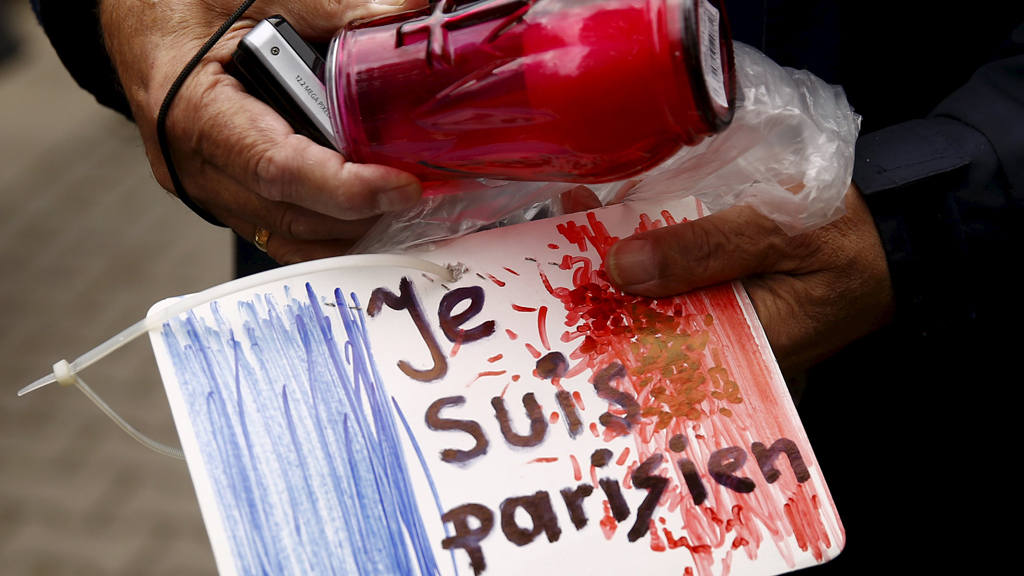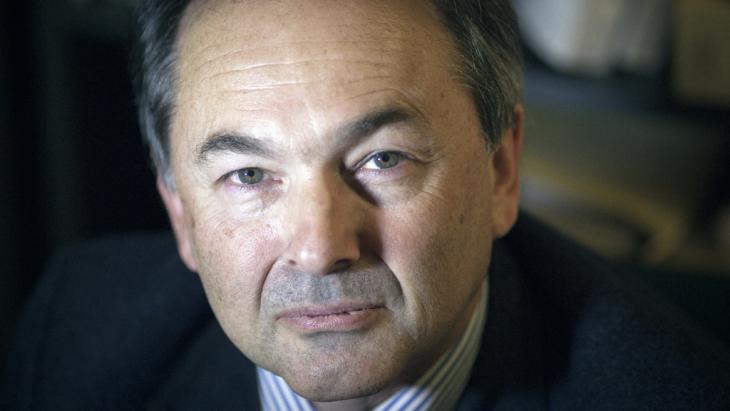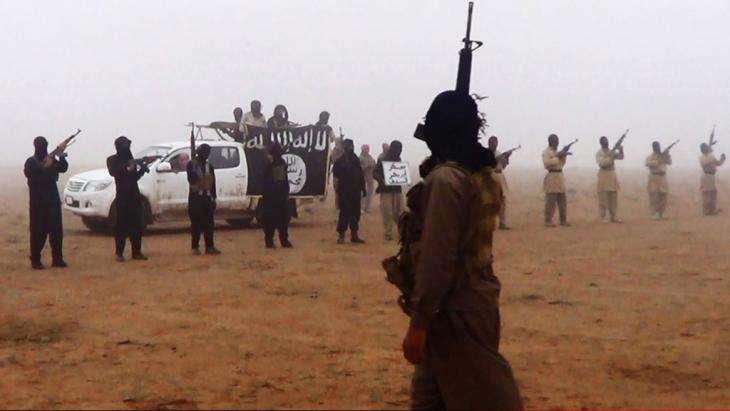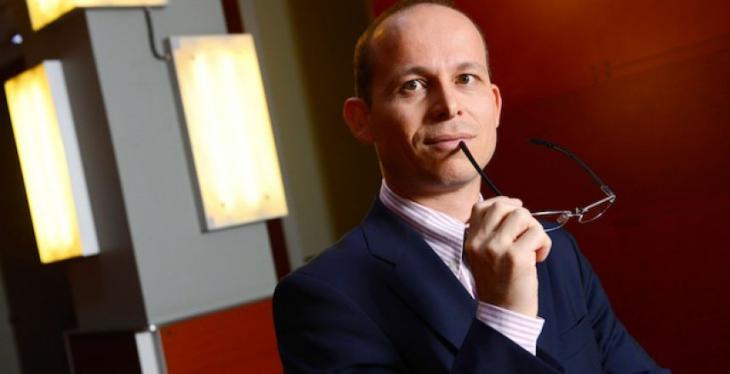Crossing a psychological line

French President Francois Hollande declares that his nation is at war with the self-proclaimed "Islamic State". Prime Minister Manuel Valls says the Paris attacks last Friday, in which 129 people died, were planned and organised from Syria. Paris presumes that IS is planning further terrorist attacks. Not only in France, but in other European countries too. The response of the French air force is to bomb suspected command centres and a training camp for "Daesh" extremists in the northern Syrian city of Raqqa.
A war scenario such as this is likely to be welcomed by IS ideologues and sympathisers. This is the logic they want to disseminate and within which they operate. The French people demonstrating in recent days on the streets of Paris, Toulouse and Lyon have so far rejected this logic. Intellectuals are also resisting it.
Gilles Kepel, a scholar of Islam at the Sciences Po University in Paris, warns that the current situation is not one that corresponds to the logic of a conventional war. "What happened in Paris is the projection of a war scenario onto French soil. For a brief moment they brought the war situation to Paris, the same situation we see in Lebanon, Syria and elsewhere – or, in other words, people blowing themselves up, young men with Kalashnikovs," he says.
Closely bound up with the Middle East conflict arena
Thus far, despite a few attacks and the huge wave of refugees from Syria and Iraq, Europeans have felt that events in the Middle East are happening a long way away, Kepel continues. That changed abruptly on Friday. Europe is closely bound up with the Middle East conflict arena, he says, first and foremost through the return of European jihadists. "It is a new phenomenon, these ′Jean Pierre Abdallah Duponts′, who go to Syria to blow themselves up there, or return to conduct attacks on French soil."

The Parisian former anti-terrorism judge Marc Trevidic has had direct contact with several of these returnees. He warned against a terrible bloodbath in late September. "Those who were willing to talk told us that the IS was planning to attack us systematically and harshly," he said, adding that the men from "Daesh" had the means to do this: money, the ability to procure as many weapons as they wanted and the ability to organise large-scale attacks.
The bloody attacks in Paris symbolise a crossing of the Rubicon in several respects: eyewitness reports say the perpetrators displayed terrifying professional cold-bloodedness. The investigation has so far revealed that this was a centrally planned operation aimed at killing as many people as possible – regardless of religion or origin. This is a new departure, emphasises Gilles Kepel. To date, he says, jihadists had selected their victims on French soil according to clear criteria.
These identified three main targets, which the chief ideologue of the modern jihad, Abu Musab al Suri, listed in a voluminous work: lay intellectuals who are critical of Islam, Jews and so-called apostates, or bad Muslims. Kepel′s conclusion: "Today in the minds of these radical Salafist jihadists, there are neither Christians, Jews, nor other Muslims. All that exists are the members of their own sect. And if you′re not as radical as they are, then you′re cleared for execution."
Many Islam and terror experts are talking about a strategy change with respect to "Islamic State". For a long time IS has focused on either achieving territorial gains in Syria and Iraq or consolidating these. Unlike the terrorists who are now competing with each other within al-Qaida – the organisation that spawned IS as a radical offshoot in Iraq – having their own territory and a quasi-governmental organisation is mandatory for the legitimisation of the self-proclaimed caliphate.
A response to military pressure?

That the export of "Holy War" and brutal violence is now being stepped up could have something to do with the fact that IS has been put under increasing military pressure in recent weeks. On the one hand by Russian troops and the radical Shia Hezbollah organisation, both fighting alongside troops loyal to Syrian President Bashar al-Assad. On the other, by the multinational anti-IS coalition, including the French air force, which began bombing "Daesh" targets in September. The latest attacks, on a Russian charter plane over the Sinai, on a Shia Hezbollah stronghold to the south of Beirut and now in Paris, may be seen as a response to this military pressure.
To date there has only been speculation over the possible motives behind these attacks: a "punitive expedition" could be part of it. But it could also be about buffing up the tarnished image of IS, which previously had been able to clock up a considerable number of victories, in the eyes of its sympathisers and potential recruits.
If statements by a former IS spy are to be believed, IS – in the wake of several major losses – currently needs new recruits. While up to 3,000 foreign fighters were applying to join the ranks daily during certain peak periods, now it′s just 50 to 60, says the man named "Abu Khaled" by "Daily Beast" journalist Michael Weiss.
"Abu Khaled" says there has also been a strategy change with respect to foreign recruits. The IS leadership now wants to encourage western sympathisers to stay in their home countries and carry out violent operations there. Other western jihadists already brainwashed during training in Syria have been sent back to their homelands with the same brief, says the source.
Europe the preferred target

Some time ago French politicians identified these returnees from Syria as one of the greatest potential dangers. Nor should it be forgotten that for the new generation of jihadists, Europe is in any case viewed as the preferred, "soft target" in the West.
In the eyes of the jihad ideologue Abu Musab al-Suri, violent attacks should be carried out in Europe rather than the US, explains Gilles Kepel. The aim of these is to split public opinion and provoke a harsh backlash against Muslims. The reasoning behind this: Muslims attacked in their home nations should be driven through fear to accept the jihadists′ extremist viewpoint and support them. In the ideal case, as the theory goes, this would result in scenarios reminiscent of civil war.
But Paris is a long way from that, thanks to the sober response of many politicians, but above all of regular French citizens. It could even be that with its bloodthirsty violence in Paris, "Daesh" may have overstepped the mark. Unlike the attacks on "Charlie Hebdo" and a Jewish supermarket in January 2015, on this occasion there was very little support in France in mainstream social media, observes Gilles Kepel: "We have found very few words of praise for the perpetrators. This is probably because these were attacks carried out in a complete blind fury. The attacks have attained a new level. This is also the first time kamikazes have been deployed in France. And all this has resulted in a sort of revival of national unity," he says.
But the Paris attacks have also shown that IS is in a position to carry out a well-coordinated, devastating attack in several locations at the same time, one that was conducted by several cells – and thousands of kilometres from the self-proclaimed Caliphate.
The preparations for this must have been long, and the training intensive. The terror specialist at the University of Toulouse, Mathieu Guidere, believes the attacks crossed a psychological line. "There has been a radical change in the terrorists′ awareness: now they can operate in Paris just as they do in Syria or Baghdad," he says.
Birgit Kaspar
© Qantara.de 2015
Translated from the German by Nina Coon
